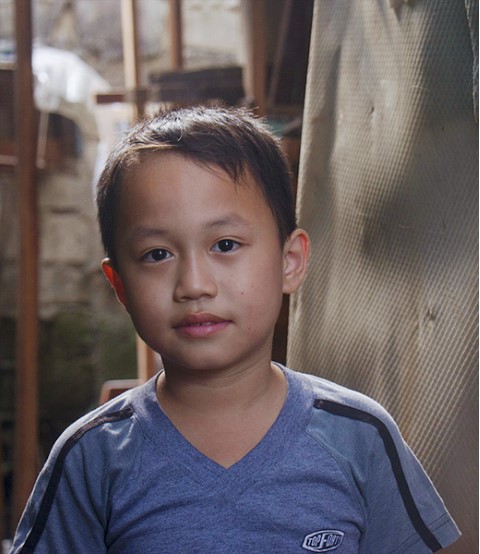
This is Justine. The 8-year-old from Manila lives in a two-room home with his parents and older brother.
Like most of Asia over the last few years, the Philippines has experienced extraordinary economic growth. Despite this growth, too many are excluded from those benefits — trapped in the generational cycle of poverty.
Justine and his mom, dad and brother are one example of the hundreds of millions of families in the Philippines who haven't reaped the rewards of their country's economic growth.

The family of four lives in Manila, the capital of the Philippines and the 12th most populous city in the world. Like many others in poverty throughout the urban center, Justine and his family share small living quarters in densely populated slums that typically house more than 200,000 people per square mile.
Their small home consists of just two rooms: one small bedroom and one slightly larger multipurpose room. Justine sleeps with his mom and dad in one bed while his older brother takes the other.

Justine and his parents all sleep on this small wooden bed tucked into the corner of their home.
Although they feel fortunate to have running water in their home, they know it may not always be safe to drink. That’s why Merlita, Justine’s mother, reserves mineral water for her youngest son. “Justine drinks mineral water while the rest of the family drinks [from] the faucet,” she explains. “Sometimes we also drink the mineral water, but we really allocate it for Justine because I am concerned that the faucet water might not be good. I want him safe.”

Justine poses with his dad, Joselita, and his mom, Merlita, in one of the few places to sit — their bed — in the home.
Merlita is a stay-at-home mom and Justine helps her out by doing chores and running errands. Justine's dad, Joselita, works as a newspaper delivery man. Joselita starts and ends work early, often beginning before the sun rises and returning home between 10 and 11 a.m.
Although Joselita is fortunate to have consistent work, the income that he earns can fluctuate wildly. Pulling in about $250 in a month is considered good for them. But, this means that any setback — even one as minor as needing money for medicine when illness or injury strikes — can lead to a major crisis.

Malnutrition is a major concern for impoverished kids like Justine in the Philippines. The country ranks 9th in the world for stunting (reduced growth rate) due to malnutrition. Caused by a poor diet in a child's first 1,000 days of life, stunting has severe, irreversible consequences on physical health and cognitive functioning.
Also, unemployment and underemployment leave many families in the Philippines struggling to meet basic needs like tuition or uniforms their kids need to attend school. And, getting to secondary school remains a challenge: Only 69% of kids from poor families continue to high school, while 94% from wealthier households attend.
Despite all the issues stacked against Justine, he's your typical 8-year-old. He hates eating his vegetables. (Merlita confesses to mixing mashed pumpkin with rice to ensure he gets his proper portion of veggies.) And he likes playing outdoors with his neighborhood friends, drawing and using his imagination playing with his toys and cars.

His participation in CI’s sponsorship program increases his chances of breaking out of poverty. He receives supplies for his primary school education, and he has access to the library and computer lab in his local community center. If he needs help in school, he can sign up for tutoring and a summer reading program. He’ll continue receiving school supplies once he’s enrolled in secondary school — and qualified teens can receive extra financial support to help them complete their schooling.
When Justine is older, he could also qualify to receive assistance to pay transportation fees if he goes to vocational or a post-secondary school. Or, he could participate in our job-skills training and placement program.
These are just a few of CI’s many programs aimed at helping kids become healthy, educated, empowered and employed to break the cycle of poverty for good.
Comments
You must be logged in to comment. If you have an account, click here to log in.